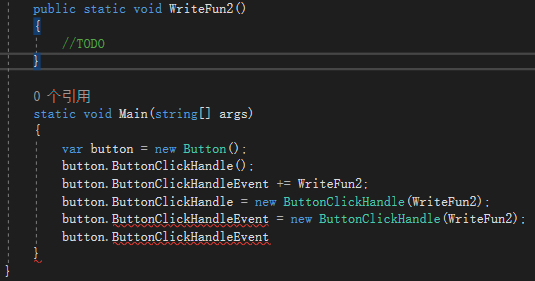From: Blog Garden - Halfway Alone
Original address: http://www.cnblogs.com/banluduxing/p/8999428.html
This article is reproduced from http://www.cnblogs.com/banluduxing , please indicate the source.
What is entrustment
The delegate keyword is added, and there is no method template (method list) of method body {};
public void Write() { // TODO } // Add the keyword delegate and remove the method body{} public delegate void Write();
use of delegation
Delegate basics use trilogy: 1 Initialize the declared delegate 2 Bind the method defined 3 Use
The parameter signature of the bound method and the declared delegate must be the same (number of parameters, corresponding type, return type)
class Program { // Define method public static void WriteFun() { // TODO } public static void GetFun( int y) { // TODO } public static string SetFun() { return ""; } //声明委托 public delegate void Write(); public delegate void Get(int x); public delegate string Set(); static void Main(string[] args) { // Initialize the delegate, binding method Write write = new Write(WriteFun); // Can be abbreviated Write write = WriteFun; Get get = GetFun; Set set = SetFun; //直接使用或者用invoke() write();//write.Invoke(); get(3);//get.Invoke(3); string str = set();//string str = set.Invoke(); } }
multicast delegation
As mentioned above, a delegate is a list of methods: a delegate can bind multiple methods at a time, and bind and unbind by += and -=;
class Program { public static void WriteFun() { //TODO } public static void WriteFun1() { //TODO } public static void WriteFun2() { // ALL } public delegate void Write(); static void Main(string[] args) { Write write = WriteFun; write += WriteFun; write -= WriteFun; write += WriteFun1; write += WriteFun2; write.Invoke(); } }
Delegates and Events
A delegate is a type , and an event is a delegate instance with the keyword event added
Compared with the above ordinary delegate instance, the event is more special, it cannot be initialized and cannot be called externally
public class Button { public ButtonClickHandle ButtonClickHandle; public event ButtonClickHandle ButtonClickHandleEvent; public void click() { if (ButtonClickHandle !=null) { ButtonClickHandle.Invoke(); } if (ButtonClickHandleEvent != null) { ButtonClickHandleEvent.Invoke(); } } } public delegate void ButtonClickHandle();
The difference is as follows

Can not be initialized and externally called, this is a security mechanism for permission control
PS
Delegates do not need to be implemented by yourself. The officially provided Action and Func delegates with or without return are sufficient.